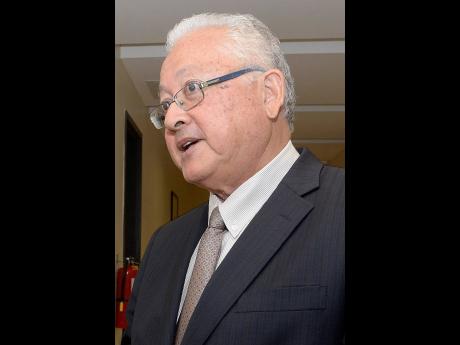Privy Council ruling won’t have bearing on proposed bail law – Chuck
Justice Minister Delroy Chuck has given assurances that the recent ruling by the Judicial Committee of the Privy Council (JCPC) will not derail the Government’s efforts to strengthen the Bail Act to reduce the chance of prospective reoffenders committing crimes while on bail.
“What is in our Constitution and what, in fact, has always been the common-law position, that bail is available to all accused persons because an accused person is innocent until proven guilty,” Chuck said after a service at Sts Peter and Paul Catholic Church commemorating the 60th anniversary of Jamaica’s Court of Appeal.
He added: “Even though the Government is looking at the Bail Act, the idea is to strengthen it … to ensure that for those who could create public disorder or abscond or may commit crimes when they are out on bail, we do an appropriate assessment to make sure that those persons are not granted bail.”
Chuck explained that the risk assessment would weigh the likelihood of an accused person committing additional crimes while on bail.
Fierce public discussion
Minister of Legal and Constitutional Affairs Marlene Malahoo Forte sparked fierce public discussion after she hinted, during her contribution to the Sectoral Debate, that persons who are charged with certain crimes may not be granted bail.
“I should like to advise the Honourable House that a new Bail Act is coming … . I will say no more at this stage, except that if you on murder charge, you cannot be at large, and if you on gun charge, you cannot be at large,” Malahoo Forte had said.
However, since then, she has repeatedly urged the public to await the specifics of the proposed amended law.
Last week, the Privy Council, Jamaica’s final appellate court, ruled against a similar law that was passed by a special majority in Trinidad and Tobago’s Parliament in 1994.
Lord Nicholas Hamblen, who delivered the JCPC’s decision, ruled that the Bail Act did not reasonably justify the infringement of citizens’ constitutional rights in applying for bail.
“Bearing in mind that less intrusive measures could have been used, the board nevertheless considers that in all the circumstances of the present case the interest of the community as expressed through the will of Parliament is outweighed by the very severe consequences of the imposition of a blanket prohibition of bail and that a fair balance has not been struck,” Lord Hamblen said.
This decision upheld an earlier ruling made by Trinidad and Tobago’s Chief Justice Ivor Archie and his two judges from the Court of Appeal on the constitutionality of the Bail Act in a case brought by Akili Charles, a former defendant accused of murder.
When asked if that ruling may throw a wrench in the Jamaican Government’s current plans, Chuck said that the judgment “merely reflects what is in our present Bail Act”.
“What I know we are trying to do is strengthen it by ensuring, outlining, and identifying areas where the clerk of the court or the prosecution could identify to the judge to ensure that they take them into consideration when they are considering bail,” he said.
During the interview, Chuck also emphasised his personal opposition to the retention of the death penalty.
Despite advocacy from pro-life lobbyists, capital punishment has remained widely popular in Jamaica, though no one has been executed since 1988.
“It is on the books, but speaking for myself, I have never been in favour of the death penalty,” said Chuck.
“To remove it is not as easy as merely passing legislation. It is actually saved by the savings law clause in the Constitution, and until we remove the savings law clause, we cannot remove the provision as it is now in the Constitution for the death penalty,” elaborated Chuck.
Debate over the value of capital punishment recently resurfaced after prosecutors sought the death penalty for self-confessed mass murderer Rushane Barnett, who slaughtered his cousin, Kemesha Wright, and her four children in Cocoa Piece, Clarendon, on June 21.
His guilty plea may cause the death penalty to be taken off the table.

